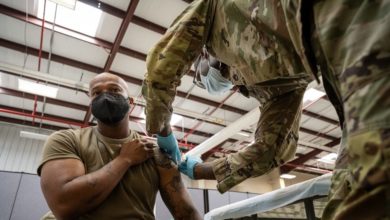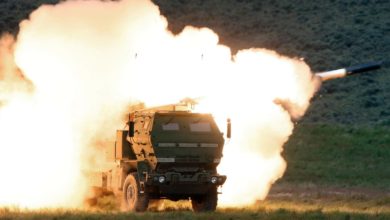Morale Is Concern as NATO Chief Warns War Could Last ‘Years’

KYIV, Ukraine — Four months of war in Ukraine appear to be straining the morale of troops on both sides, prompting desertions and rebellion against officers’ orders, British defense officials said Sunday. NATO’s chief warned the fighting could drag on for “years.”
“Combat units from both sides are committed to intense combat in the Donbas and are likely experiencing variable morale,” Britain’s defense ministry said in its daily assessment of the war.
“Ukrainian forces have likely suffered desertions in recent weeks,” the assessment said, but added that “Russian morale highly likely remains especially troubled.”
It said “cases of whole Russian units refusing orders and armed stand-offs between officers and their troops continue to occur.”
According to an Institute for the Study of War report, the Ukrainian Main Intelligence Directorate also released intercepted calls from Russian soldiers complaining about conditions on the front line, inadequate equipment and a general lack of personnel.
In an interview published on Sunday in the German weekly Bild am Sonntag, NATO Secretary-General Jens Stoltenberg said that “nobody knows” how long the war could last. “We need to be prepared for it to last for years,” he said.
He also urged allies ”not to weaken support for Ukraine, even if the costs are high, not only in terms of military aid, but also because of the increase in energy and food goods prices.”
In recent days, Gazprom, the Russian gas company, has reduced supplies to two major European clients — Germany and Italy. In Italy’s case, energy officials are expected to huddle this week about the situation. The head of Italian energy giant ENI said on Saturday that with additional gas purchased from other sources, Italy should make it through the coming winter, but he warned Italians that “restrictions” affecting gas use might be necessary.
Germany will limit the use of gas for electricity production amid concerns about possible shortages caused by a reduction in supplies from Russia, the country’s economy minister said on Sunday. Germany had been working to increase the capacity of its gas storage units ahead of winter.
Robert Habeck, Economy Minister said Germany would try to offset the change by burning more coal. This is a polluting fossil fuel. “That’s bitter, but it’s simply necessary in this situation to lower gas usage,” he said.
Stoltenberg stressed, though, that “the costs of food and fuel are nothing compared with those paid daily by the Ukrainians on the front line.”
Stoltenberg added: What’s more, if Russian President Vladimir Putin should reach his objectives in Ukraine, like when he annexed Crimea in 2014, “we would have to pay an even greater price.”
Britain’s defense ministry said that both Russia and Ukraine have continued to conduct heavy artillery bombardments on axes to the north, east and south of the Sieverodonetsk pocket, but with little change in the front line.
Luhansk governor Serhiy Haidai said via Telegram on Sunday: “It is a very difficult situation in Sievierodonetsk, where the enemy in the middle of the city is conducting round-the-clock aerial reconnaissance with drones, adjusting fire, quickly adjusting to our changes.”
Russia’s defense ministry claimed on Sunday that Russian and separatist forces have taken control of Metolkine, a settlement just to the east of Sievierodonetsk.
Bakhmut, which is located in the Donbas region, lies 55km (33 miles) south of twin cities Lysyhansk & Siervierodonetsk. Here, there have been fierce military clashes. Bakhmut is being bombarded by Russian artillery each day.
But Bakhmut’s people try to go about their daily lives, including shopping in markets that have opened again in recent weeks.
“In principle, it can be calm in the morning,” said one resident, Oleg Drobelnnikov. ”The shelling starts at about 7 or 8 in the evening.” Still, he said, it has been pretty calm in the last 10 days or so.
“You can buy food at small farmer markets,” said Drobelnnikov, a teacher. ”It is not a problem. The situation is not a problem in principle. Schools and kindergartens aren’t working. These institutions have moved to more favorable regions. There is no work here.”
Ukraine’s east has been the main focus of Russia’s attacks for more than two months.
Volodymyr Zelenskyy, the Ukrainian president, made Saturday’s trip from Kyiv south to meet troops and workers at hospitals in Odesa and Mykolaiv regions near the Black Sea. He greeted everyone he met and gave them awards, shaking hands and thanking them all for their support.
Zelenskyy, in a recorded address aboard a train back to Kyiv, vowed to defend the country’s south.
“We will not give away the south to anyone, we will return everything that’s ours and the sea will be Ukrainian and safe.”
He added: “Russia does not have as many missiles as our people have a desire to live.”
Zelenskyy also condemned the Russian blockade of Ukraine’s ports amid weeks of inconclusive negotiations on safe corridors so millions of tons of siloed grain can be shipped out before the approaching new harvest season.
In other attacks in the south, Ukraine’s southern military operational command said Sunday that two people were killed in shelling of the Galitsyn community in the Mykolaiv region and that shelling of the Bashtansky district is continuing.
Russia’s defense ministry said seaborne missiles destroyed a plant in Mykolaiv city where Western-supplied howitzers and armored vehicles were stored.
British Prime Minister Boris Johnson has expressed concerns “that a bit of Ukraine fatigue is starting to set in around the world.”
“It would be a catastrophe if Putin won. He’d love nothing more than to say, ‘Let’s freeze this conflict, let’s have a cease-fire,’” Johnson said on Saturday, a day after a surprise visit to Kyiv, where he met with Zelenskyy and offered offer continued aid and military training.
Heavy weapons supplied by the West are being used on front line. But Ukraine’s leaders have insisted for weeks that they need more arms and they need them sooner.
Read More From Time




